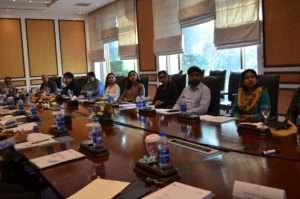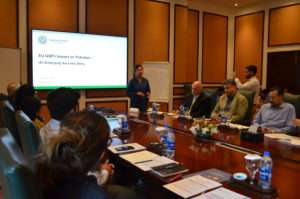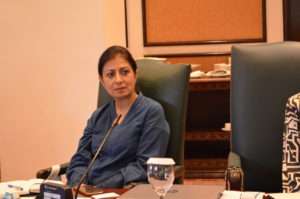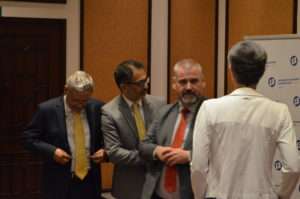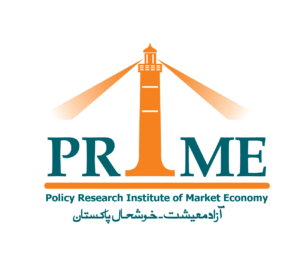
European Union’s GSP+ highlighted as a critical arrangement for Trade and Good Governance
Policy Research Institute of Market Economy (PRIME) has organized a roundtable conference on the launch of its report “Pakistan and the European Union (EU) under GSP+” in collaboration with Friedrich Naumann Foundation for Freedom (FNF) Pakistan. The report provides an update and analysis of the EU’s GSP+ status of Pakistan while also reviewing the current trade outlook of Pakistan in the world.
Pakistan was awarded EU’s Generalized System of Preferences (GSP+) status on 1st of January 2014 that aimed at promoting economic stability and good governance in the country. The status, which expires in December 2023, provides full removal of duties on most of the European Union’s tariff lines and is subject to compliance with 27 International Conventions.
Keeping in view the importance of Pakistan’s trade with EU i.e., a major export destination, representatives from the government, international community, private sector and think tanks actively took part in the consultative session.
Ms. Sarah Javaid, Research Economist at PRIME and author of the report highlighted the importance of the EU’s GSP+ for Pakistan while stating key findings from the report such that Pakistan’s exports to the EU have increased from an aggregate USD 37 billion (2007-13) to an aggregate USD 66 billion (2014-2022) and currently stand at USD 7.6 billion (10 months) in 2022. Referring to the report she added that Pakistan needs to sustain the GSP+ status post-2023 since in the absence of this arrangement, Pakistan would be subject to a maximum MFN tariff of 12% on the most traded tariff lines falling under this status. Moreover, the biggest beneficiary sector of GSP+ i.e. the textile sector, would have to bear a loss of exports worth USD 1.5 billion in form of exports.
Keeping in view the current status of the GSP+ for Pakistan, Mr. Thomas Seiler, Charge d’Affaires, European Union, appreciated the report and added that if the GSP+ continues given that Pakistan improves its compliance with the 27 UN Conventions, Pakistan would see a greater impact of modernization in the country as this status will improve the lives of its citizens. He added, exports from Pakistan to EU have increased due to GSP+ but growth should not be restricted to textile sector only. Furthermore, an assessment report that would be finalized in October 2022 would set the grounds for Pakistan’s readmission for GSP+ 2024-33’. Shedding some light on the new GSP+ regime, Mr. Thomas Seiler added to the discussion that Pakistan would have to re-apply for the next GSP+ status for which the European Parliament has approved a draft regulation where one of the requirements include abolishment of death penalty in Pakistan. Moreover, the new GSP+ of the EU would be subject to effective compliance with new conventions in addition to previous 27. He added that the work is still on going and the discussions are under progress.
Mr. Atif Aziz, Joint Secretary, Ministry of Commerce, stated that the Government of Pakistan is actively participating in ensuring the compliance with the 27 UN Conventions. The fourth and final Monitoring Mission by the EU has been recently concluded and the new scheme is in the discussion phase which would be officially notified by the Government of Pakistan once it is finalized.
Ms. Saleha Asif, CEO of Pakistan Textile Council (PTC) said that EU’s GSP+ is an emerging success story that has created better jobs and reduced poverty in many sectors of Pakistan. Stressing upon the importance of this arrangement for textile sector of Pakistan, Ms. Saleha said that apparel sector being supported by GSP+ employees more than 33% women. Moreover, the program does not just support Pakistan’s trade but also tends to improve working conditions especially in the export-oriented sectors and also benefits EU’s market with competitive supply of textiles.
Dr. Vaqar Ahmed, Joint Executive Director, Sustainable Development Policy Institute (SDPI), exchanged his thoughts on the GSP+ status and added that its more of a political process rather bureaucratic. Focusing upon challenges being faced by the exporters in Pakistan, Dr. Vaqar said that firms in the vulnerable regions of Pakistan do not have trade finance. He was of the view that there is a need for an analysis on how the Pakistan’s trade policy and sectoral policy have assisted EU’s GSP+ while also keeping in view current schemes such as the tariff board, DTRE, and Manufacturing Bond.
Dr. Manzoor Ahmad, Pakistan’s former Ambassador at the WTO/Senior Fellow PIDE, argued that trade arrangements like the EU’s GSP+ are no doubt beneficial but there is a need to take bigger and smarter steps. Pakistan needs to have more Free Trade Agreements (FTAs) and not restrict its trade policy to the short term. In addition to that, he informed the audience that Pakistan has been losing its international market share by 1.5% for the last couple of years and that there is a dire need for empirical studies before formulating such arrangements to understand where the country needs to go.
Ms. Birgit Lamm, Head of the Country Office Pakistan, Friedrich Naumann Foundation for Freedom (FNF) said that GSP+ is not only a trade facilitation tool, but an opportunity for modernization in socio-economic, good governance & sustainability aspects for Pakistan and that it should strive to validate this status after 2023 in the interest of inclusive development.
Mr. Ali Salman, Founder and ED PRIME, concluded the event while saying that Pakistan should carefully evaluate all options for the future trade policy including joining regional partnerships like Regional Comprehensive Economic Partnership (RCEP). He also emphasized that Pakistan’s constitution guarantees necessary personal, civil, and religious freedoms that are required by GSP+.
This consultative event was organized by PRIME in collaboration with FNF.
For inquiries, please contact saad@primeinstitute.org or call at 03345397644.
Find some of the glimpses from the said event, below:



